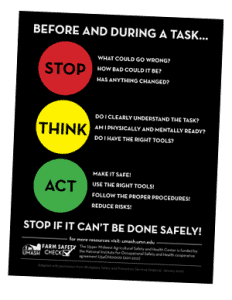
APRIL 2020
Our neighbors to the North in Canada, Workplace Safety & Prevention Services (WSPS), with Imperial Oil, have developed a simple, but effective reminder to practice safety and health on the farm. It is only three words but says it all when preventing injuries or other tragedies from occurring. Stop Think Act is just one tool to encourage farmers to take a minute to stop and think before acting on a task or job.
Essentially, the goal is to:
Stop long enough to think about what you’re about to do
Think about how you’re going to do it. Is it the safest way? If not, how can you do it better?
Act in the safest way possible
How can you use Stop Think Act in your farming operation or ag business?
Think about using this tool as a means to make your farm a safer workplace. Break down your farm safety concerns into manageable pieces and use Stop Think Act as an overall theme to any and all safety issues on the farm.
If you can just get yourself and your workers to think for only a few seconds before doing anything, you can prevent a lot of injuries. Look at Stop Think Act as an opportunity to do things better and smarter. The time you save by acting impulsively is minuscule compared to the potential consequences.
4 Ways to Apply Stop Think Act Now:
These suggestions from Steve Zronik take only moments to implement but offer lifelong benefits
- Start with yourself. Develop your own Stop Think Act habit so that you’re keeping yourself safe and constantly demonstrating the desired behavior.
- Build it into orientation training so that everyone hears the message from the beginning.
- Reinforce it during your weekly or daily meetings. These meetings are an ideal opportunity for everyone to discuss hazards and how to stay safe.
- Coach workers one on one. Before someone starts a new task, work through the Stop Think Act process together.
“Watch for people acting impulsively,” adds Anderson. “They may not be taking into account what could go wrong. They start at Point A and don’t think of the consequences that may occur at Points B and C.”
This project is funded in part by the Ontario Ministry of Agriculture, Food and Rural Affairs.
Used with permission from the Workplace Safety & Prevention Services & Imperial Oil


 UMASH has developed a Farm Safety Check and poster to offer farms, farmers and workers an incentive to apply Stop Think Act to their operation.
UMASH has developed a Farm Safety Check and poster to offer farms, farmers and workers an incentive to apply Stop Think Act to their operation.